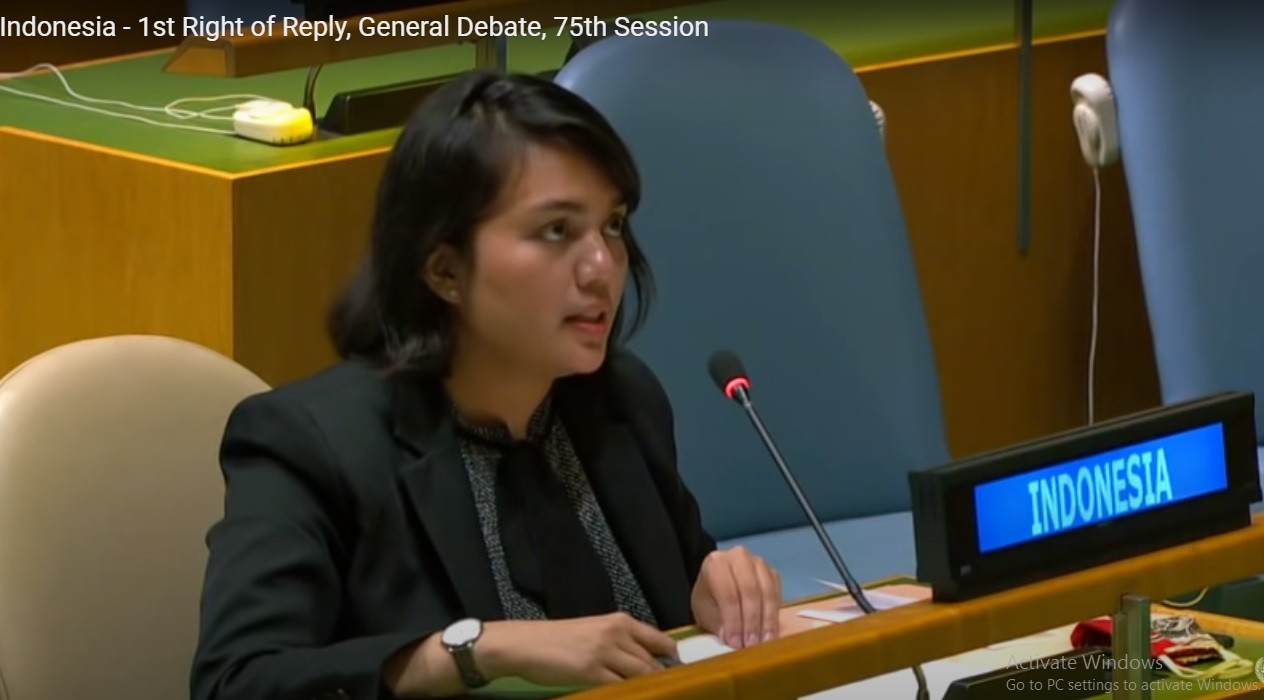Popular Reads
Top Results
Can't find what you're looking for?
View all search resultsPopular Reads
Top Results
Can't find what you're looking for?
View all search resultsPapua needs more than junior diplomacy
Indonesia has only humiliated itself in such a prestigious forum as the UNGA, because this stunt is no different from that often pulled by undemocratic states like North Korea.
Change text size
Gift Premium Articles
to Anyone
 Indonesian diplomat Silvany Austin Pasaribu speaks during the 75th session of the General Assembly of the United Nation (UN) on Saturday, Sept 26, 2020. When exercising Indonesia's right to reply, Silvany defended the government's sovereignty over Papua and West Papua and criticized the Republic of Vanuatu over its interference disguised under 'artificial human rights concerns'. (JP/screenshot from UN Youtube channel)
Indonesian diplomat Silvany Austin Pasaribu speaks during the 75th session of the General Assembly of the United Nation (UN) on Saturday, Sept 26, 2020. When exercising Indonesia's right to reply, Silvany defended the government's sovereignty over Papua and West Papua and criticized the Republic of Vanuatu over its interference disguised under 'artificial human rights concerns'. (JP/screenshot from UN Youtube channel)
T
he United Nations General Assembly (UNGA) has only just ended. Apart from President Joko “Jokowi” Widodo’s pre-recorded speech, Indonesia made a mark during the annual world event because of alleged human rights abuses in Papua. It was clearly a slap in Indonesia’s face when UN Secretary-General Antonio Guterres included in his annual report alleged rights abuses against Papuan activists.
In its headline story on Sept. 28, The Jakarta Post reported that the government was facing greater international scrutiny as violence continues to simmer in the country’s easternmost, least developed but natural-resource rich, provinces.
Indonesia is among 45 countries accused of intimidating and retaliating against human rights defenders, according to the Guterres’ report, released on Sept. 17.
“Between May 2020 and April this year, five individuals seeking to cooperate with UN human rights agencies – Wensislaus Fatubun, Yones Douw, Victor Mambor, Veronica Koman and Victor Yeimo – were subject to threats, harassment and surveillance by government, non-state and private actors, including business enterprises and local political actors”, the Post quoted the report as saying.
The government’s repeated denials will only increase international misperceptions about what really is happening in Papua, simply because Papua has long been declared a closed territory to foreigners for security reasons. It is a frustrating undertaking for Indonesian diplomats to defend the country from attacks over alleged human rights violations in Papua because the root problems lie deep in the land of Papua.
As long as the alleged human rights abuses and exploitation of natural resources in Papua remain unaddressed, resentment among local people toward the government will grow stronger. At the same time Indonesian diplomats need creative ways that are internationally acceptable to promote the government’s commitment and actions to bring prosperity and justice to Papua.
In last year’s UNGA debate Indonesia fielded a junior diplomat to read out the government’s rebuttal of Vanuatu’s Prime Minister Bob Loughman Weibur’s harsh criticism regarding the situation in Papua. This year, Indonesia used the same tactic by assigning a junior diplomat to counter the argument of the Pacific state leader about Papua.
Such a strategy might encourage nationalist sentiment among the populace back home, but actually Indonesia has only humiliated itself in such a prestigious forum as the UNGA, because this stunt is no different from that often pulled by undemocratic states like North Korea. Besides, the choice of a junior diplomat for the job reflects Jakarta’s arrogance, indeed lack of seriousness, in addressing the Papua problems.
This sort of diplomacy is counterproductive to Indonesia’s efforts to establish a peaceful and dignified solution for our Papuan brothers and sisters. The government should not belittle the voices of those who defend Papuans. Rather, the criticisms should prompt us to find out the flaws in our approach to Papua.
It is true that the situation in the two provinces is confusing for outsiders. Are the ongoing armed clashes between the security forces and the rebels genuine? Whatever the motives behind the acts of violence, people at the grass roots must pay the price.
Assigning junior diplomats to stave off criticism does not help the international community comprehend Papua better.









